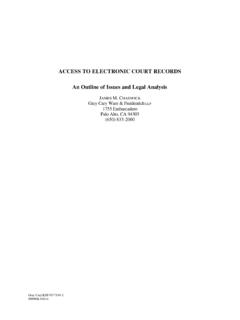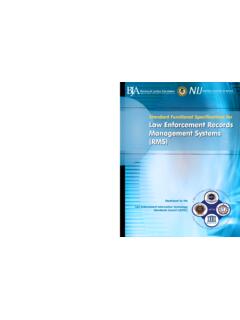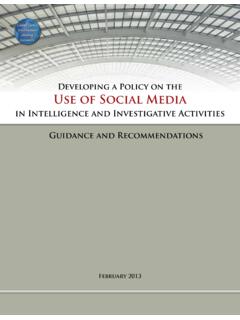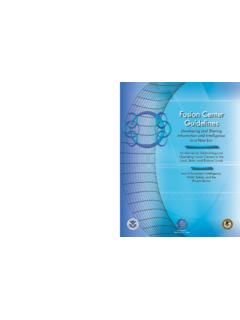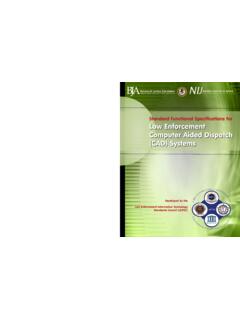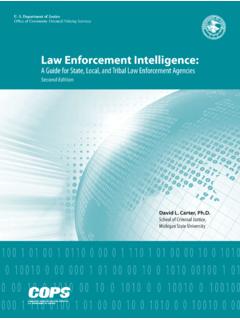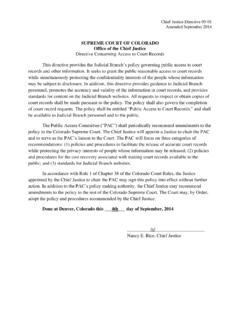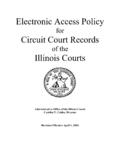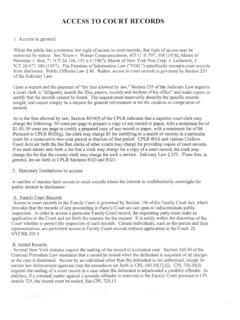Transcription of Concept Paper on Access to Court Records
1 Concept Paper on Access to Court Records Conference of State Court Administrators August 2000. GOVERNMENT RELATIONS OFFICE. 2425 Wilson Boulevard, Suite 350. Arlington, Virginia 22201. Tel: 703/841-0200 Fax: 703/841-0206. CONFERENCE OF STATE Court A DMINISTRATORS. Board of Directors, 2000-2001. President: David K. Byers, Arizona President-elect: Kenneth R. Palmer, Florida Vice President: Mercedes M. Bauermeister, Puerto Rico Howard W. Conyers, Oklahoma Daniel Becker, Utah Patrick A. Chenovick, Montana Kingsley W. Click, Oregon Keithe E. Nelson, North Dakota Michael F. Broderick, Hawaii Jonathan Lippman, New York Policy and Liaison Committee Chair: Daniel Becker, Utah Vice Chair: Mercedes M. Bauermeister, Puerto Rico David K. Byers, Arizona Sue K. Dosal, Minnesota Hugh M. Collins, Louisiana Thomas W. Ross, North Carolina James D. Gingerich, Arkansas Jonathan Lippman, New York Michael L.
2 Buenger, Missouri Kingsley W. Click, Oregon William C. Vickrey, California James M. Albert, West Virginia John D. Ferry, Jr., Michigan Barbara Dortch-Okara, Massachusetts Patricia Tobias, Idaho Frank W. Gregory, Alabama Robert N. Baldwin, Virginia The Conference of State Court Administrators (COSCA) was organized in 1953. and is composed of the principal Court administrative officer in each of the fifty states, the District of Columbia, the Commonwealth of Puerto Rico, the Commonwealth of the GOVERNMENT RELATIONS OFFICE Page ii 2425 Wilson Boulevard, Suite 350. Arlington, Virginia 22201. Tel: 703/841-0200 Fax: 703/841-0206. CONFERENCE OF STATE Court A DMINISTRATORS. Northern Mariana Islands, and the Territories of American Samoa, Guam, and the Virgin Islands. GOVERNMENT RELATIONS OFFICE Page iii 2425 Wilson Boulevard, Suite 350. Arlington, Virginia 22201. Tel: 703/841-0200 Fax: 703/841-0206.
3 CONFERENCE OF STATE Court A DMINISTRATORS. Concept Paper on Access to Court Records Note: A Paper was prepared by the Policy and Liaison Committee of the Conference of State Court Administrators (COSCA) for presentation at that organization's Business Meeting on August 3, 2000, in Rapid City, South Dakota. The purpose of the Paper was to generate discussion and debate, preparatory to the membership being asked to take a policy position on Access to courts . The Paper itself was not adopted by the membership. The membership did amend the recommendations of the committee. The amended recommendations, as approved by the membership, are represented in Section IX of this Concept Paper . GOVERNMENT RELATIONS OFFICE Page iv 2425 Wilson Boulevard, Suite 350. Arlington, Virginia 22201. Tel: 703/841-0200 Fax: 703/841-0206. CONFERENCE OF STATE Court A DMINISTRATORS. Table of Contents Page I.
4 The Computer Does More than Compute: The Issue 1. II. We Hold These Truths to Be Self-Evident: Principles 1. III. 78's, 45's and CD's: Defining Records 2. IV. One Sides' Ice and One Is Fire: Classifying Records 3. V. Never the Twain Shall Meet: Separating Public 6. and Restricted Records VI. What You See Is What You Get: Access 7. VII. Freedom of Information Isn't Free: Funding 7. VIII. Conclusion 9. IX. Recommendations 10. GOVERNMENT RELATIONS OFFICE Page v 2425 Wilson Boulevard, Suite 350. Arlington, Virginia 22201. Tel: 703/841-0200 Fax: 703/841-0206. CONFERENCE OF STATE Court A DMINISTRATORS. I. The Computer Does More than Compute: The Issue Gleaning information from Paper Records has always been difficult, time consuming and costly. Computers change that. Computers make available in a real sense Records always considered public but hitherto difficult to obtain. Computers routinely compile and arrange Records as a simple by-product of data input for each case.
5 Computers create, in a matter of minutes or hours, reports of statistics, trends and profiles that once required weeks or months of research, tabulation and calculation. Computers report data, but they also transfer data among the courts and to the public. These and other attributes make computers an essential and incredibly powerful tool, but they pit freedom of information against confidentiality as never before. The conflict will grow even more complex as the evolution of electronic filing makes available to the public electronic documents and not just data elements. II. We Hold These Truths to Be Self-Evident: Principles 1. The public has a qualified right of Access to Court Records . 2. The public has an interest in restricting Access to Court Records under some conditions. 3. An individual has a right of privacy in personal information recorded by the judiciary. 4. A compiled record is significantly more intrusive than the individual Records from which the compilation is built.
6 5. The judiciary is obligated to provide Access to public Court Records and to improve the convenience of that Access . 6. The judiciary is obligated to secure restricted Records from public scrutiny. 7. The judiciary is obligated to ensure the accuracy, completeness and timeliness of Court Records ; to protect the integrity of Court Records ; and to prevent undue disruption to the work in Court offices. 8. Improved Access to public Court Records benefits both the requesting party and the public. The cost of Access should be shared by the requesting party and the public. GOVERNMENT RELATIONS OFFICE Page 1. 2425 Wilson Boulevard, Suite 350. Arlington, Virginia 22201. Tel: 703/841-0200 Fax: 703/841-0206. CONFERENCE OF STATE Court A DMINISTRATORS. Access to Court Records balances two competing public interests: allowing and even encouraging Access to the institutions of government and restricting Access when an identifiable interest requires confidentiality.
7 The judiciary should invest its time in achieving that balance: determining what is public, what restricted. Once determined, the public and the judiciary mutually benefit when Access to public Court Records is convenient and inexpensive and the security of restricted Court Records is as complete as procedures, training and funding can achieve. III. 78's, 45's, and CD's: Defining Records The definition of record should be expansive, including all materials and information created by or received by the judiciary. The term should include case management materials and data such as pleadings, the record of hearings, and the data elements, which constitute the record of events in a case. The term should also include Court management materials and data, such as budgets, reports and statistics. These examples are not intended to limit the definition but rather to show the variety of Records created or received by the courts.
8 Some may argue for a narrower definition of record , but whether a Court record should be restricted (discussed below) is a more constructive debate than whether a particular datum is a record . Although the judiciary needs to anticipate the availability of newly created Court Records , whether to create or receive a record and whether to create or receive a record in an electronic format should be driven, not by the record 's subsequent availability, but by what is necessary for the just determination of a dispute and by what is necessary for the sound administration of justice. Many factors, such as the emerging jurisprudence of restorative justice and increasingly active case management, influence the Court to require more information about the parties, the nature of the case and the events of the case. Court management increasingly includes the ability to cross-tabulate information and to answer the relevant inquiries of the legislature and the public.
9 Whether to build a data warehouse is a decision best left to the discretion of judicial leaders, but, once built, a data warehouse is just as much a Court record as the more traditional annual report, and, barring a countervailing policy to restrict Access , is just as much a public record . The judiciary would be well-served to abandon distinctions based on official Records or core Records . There are, simply, Court Records . Some are public, some restricted, but they are all Court Records . Whether the record is official or unofficial, core or collateral has no relevance to its availability. The judiciary would be well-served to abandon distinctions based on the medium in which the record is recorded. If multiple iterations of a public record exist, the electronic document is just as public as the Paper document, and Access to both should be as convenient as possible. GOVERNMENT RELATIONS OFFICE Page 2.
10 2425 Wilson Boulevard, Suite 350. Arlington, Virginia 22201. Tel: 703/841-0200 Fax: 703/841-0206. CONFERENCE OF STATE Court A DMINISTRATORS. IV. One Side's Ice and One Is Fire: Classifying Records Balancing the interests of Access and privacy is not a new task. Most states have freedom of information statutes or rules, many enacted decades ago. The information age, with its ubiquitous computers and worldwide network of communications, has sparked renewed interest in the issues, and, more important, it has influenced the debate. Even the earliest FOI. laws provide answers to today's questions of Access and privacy simply by inferring parallels between traditional Paper -based operations and modern technologies. But these answers may not satisfy. Parallels are very often useful and may be a legitimate start to the discussion, but parallels should not control the result. Technology and societal expectations evolve, and the law must evolve to accommodate them.
